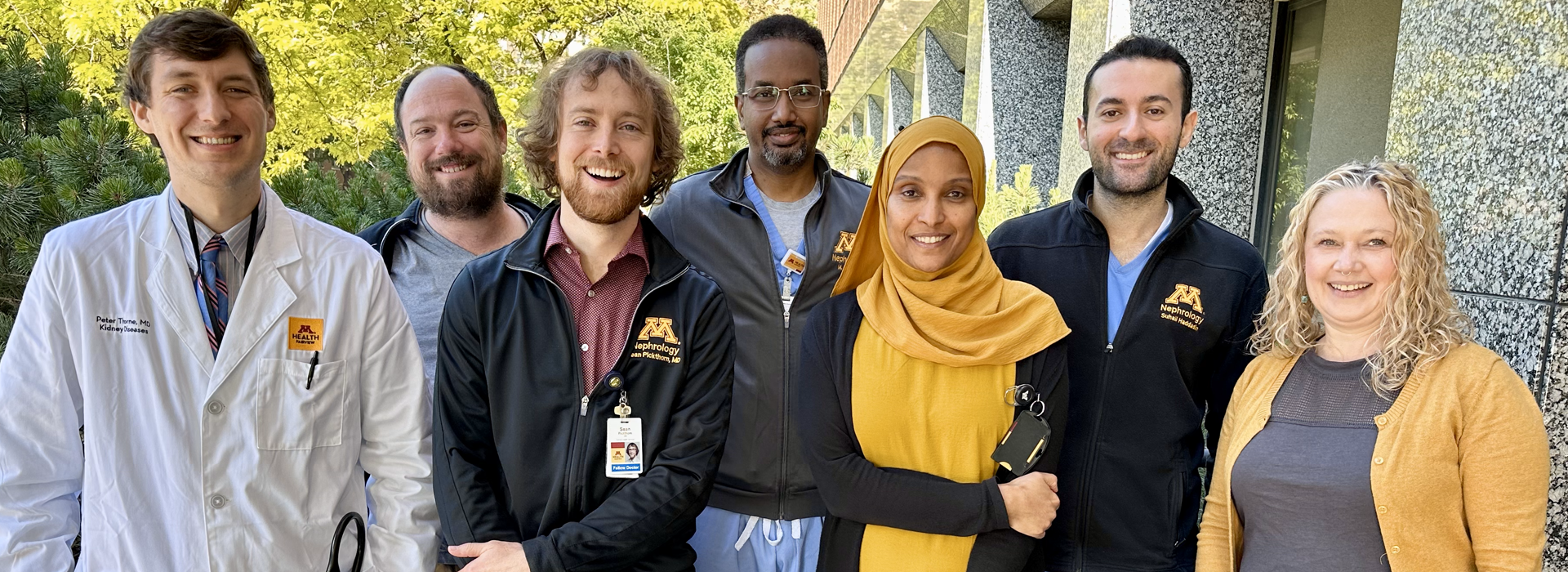
Nephrology and Hypertension Fellowship Program
Pictured L to R: Associate Program Director P. Thorne; Fellows A. Dayton, S. Pickthorn, M. Kassim, M. Ahmed, and S. Haddadin; and Program Director S. Elfering
Patients with kidney disease need skilled clinicians prepared to engage in collaborative, multidisciplinary care. At the University of Minnesota, we are driven to improve the health of patients by improving quality of care through innovative therapies.
Our two-year, ACGME-accredited fellowship and advanced one-year fellowships in Transplant Nephrology and Glomerular Diseases provide ample clinical and research experiences for fellows to individualize their training to meet their career goals and expand their career opportunities.
WHY THE U OF MN?
The University of Minnesota Medical School is committed to excellence. Our mission will only be achieved through embracing and nurturing an environment of diversity, inclusiveness, equal opportunity, and respect for the similarities and differences in our community.
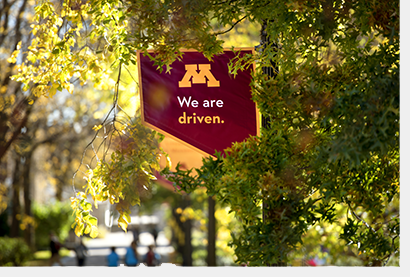
We strive to create an atmosphere where differences are valued and celebrated, knowing institutional diversity fuels the advancement of knowledge, promotes improved patient care and fosters excellence. We will train a culturally aware workforce qualified to meet the needs of the diverse populations we serve. We especially strive to have our community better reflect the broad range of identities in our state, including race, ethnicity, gender identity, gender expression, sexual orientation, disability, age, national origin, religious practice, and socioeconomic status.
Our Nephrology fellowships have graduated more than 150 fellows since our first accreditation in 1987. In addition to our general nephrology and transplant nephrology fellowships, we have added a new fellowship in glomerular diseases and vasculitis.
More about the University of Minnesota
Special Notice: The University of Minnesota Medical School response to COVID-19
RESEARCH
The University of Minnesota Medical is a research leader, with funding of $246 billion from the NIH in 2018, including 22 institutional training grants, 24 individual awards, and almost $15 million for research centers. The National Science Foundation consistently ranks the U among the top 10 of public research universities; the Twin Cities had $922 million in expenditures in 2018.
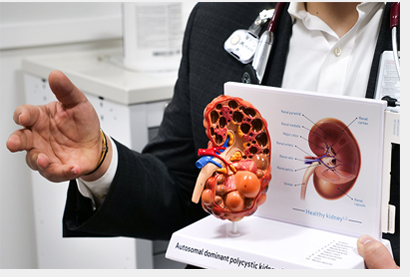
Nephrology and Hypertension faculty are currently participating in eight NIH-sponsored clinical trials through two research centers that bring together experts from across the M Health system for collaborative care.
The Minnesota Multidisciplinary Vasculitis Program provides patients with systemic inflammatory disease or vasculitis with cutting-edge, individualized, comprehensive and integrated multidisciplinary care and access to Phase 2 and Phase 3 clinical trials in ANCA Vasculitis and Systemic Lupus Erythematosus/Lupus Nephritis.
The Minnesota Glomerular Diseases Program offers expert, individualized care to patients with any glomerular disease, with ongoing Phase 2 and Phase 3 clinical trials in Focal Segmental Glomerulosclerosis (FSGS), Membranous Nephropathy, and IgA Nephropathy.
Specialized Training
The M Health Clinic & Surgery Center is home to the many specialized kidney care clinics where our faculty and fellows provide comprehensive and innovative care. Current multidisciplinary clinics include Genetic Kidney Diseases, Glomerular Diseases, Hypertension, Kidney Stones, Onco-Nephrology, and Vasculitis.
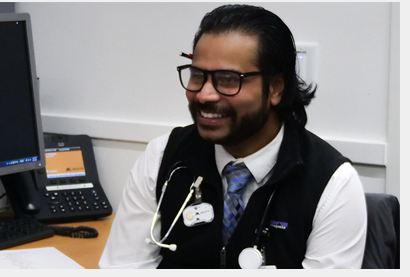
Our kidney transplant program, one of the largest and oldest in the world, offers fellows exceptional clinical experiences in evaluating donor and transplant recipients and following patients through pre- to post-operative transplant.
Graduates of our Nephrology Fellowship program are prepared to:
- Provide high quality care through patient-centered rotations in a range of clinical settings with dedicated teaching faculty
- Investigate their own clinical research questions and hypotheses
- Practice in an academic nephrology program or busy private practice
- Pursue advanced training through our Transplant Nephrology or Glomerular Diseases & Vasculitis fellowships
Our fellowship program has been right-sized to ensure fellows have the best experience possible during their training. Our faculty are dedicated to our trainees' experience, which means finding the right work life balance. Here are some highlights:
- Fellows take call one in 4-5 days, and no more than two nights in a row.
- Inpatient teaching service at the University is fellow-managed and supported by a dedicated teaching faculty. This service consistently has internal medicine residents and medical students, with a capped census to ensure adequate time for bedside teaching. Three advanced practice providers work in the hospital to support fellows and faculty and care for patients on the non-teaching service.
- A cohort of young faculty infuses energy into the fellowship program. Modern era learners benefit from evidence-based medical education. We encourage active learning techniques and the use of technology with a focus on participation and engagement of learners rather than isolated powerpoint-driven lectures.
Fellows rotate at M Health Fairview Medical Center and the Clinics & Surgery Center on campus, plus the highly-rated Minneapolis VA Medical Center.
Rotations include University, Transplant and VA Consults plus rotations in Outpatient Transplant, Specialty Clinics, Pathology, Apheresis and Palliative Care. Fellows have continuity dialysis experience, including home dialysis modalities and in-center dialysis.
Advanced fellowship opportunities provide a seamless training experience to prepare graduates for specialized practice.
- Transplant Nephrology: this one-year fellowship, accredited by the Transplant Nephrology Fellowship Training Accreditation Program, prepares graduates to head UNOS approved transplant nephrology programs.
- Glomerular Diseases & Vasculitis: this unique one- or two-year fellowship prepares graduates with specialized training and medical knowledge for better targeted, more effective, and safer treatment of patients with glomerular diseases or vasculitis.
University of Minnesota is one of the oldest and prestigious transplant programs in the country. Greater than 13,000 organ transplants including 10,000 kidney transplants have been performed at University of Minnesota including the world's first pancreas transplant in 1966. We average ~200 kidney transplants per year with half from deceased donors and half from living donors. We routinely perform close to 30 simultaneous kidney-pancreas transplants, 5-10 simultaneous liver-kidney transplants, and 2-4 simultaneous heart-kidney transplants per year.
This 1-year Transplant Nephrology Fellowship Training Accreditation Program accredited fellowship is clinically robust and centered around making the selected candidate a well-rounded clinical transplant nephrologist qualified to head a United Network for Organ Sharing (UNOS) transplant nephrology program. The transplant fellow rotates between the inpatient transplant nephrology consult service where they will work closely as a consultant with the transplant surgery service, outpatient transplant nephrology clinic where they will see post-transplant patients as well as evaluate potential transplant and donor candidates. 1 week will be spent in the HLA lab, 3 weeks on the inpatient transplant ID consult service, and 4 weeks on research with the goal to present an oral abstract at American Transplant Congress. The transplant nephrology fellowship has a well-designed didactic curriculum taught by world experts in organ transplantation with decades of experience. There are a number of additional research opportunities in clinic outcomes research, basic science research, and xenotransplantation available as well.
Applications may be sent directly to the Program Coordinator throughout the year.
The Glomerular Diseases and Vasculitis Fellowship offers specialized training in autoimmune diseases affecting the kidney and other forms of glomerular diseases. Graduates in this sub-subspecialty of Nephrology will have expertise, specialized training, and medical knowledge for better targeted, more effective, and safer treatment of patients with glomerular diseases or vasculitis. The fellowship leverages the diverse expertise of University of Minnesota faculty with a strong clinical referral center and research program for a well-rounded training experience.
This is a one-year fellowship, although a second year may be available for motivated fellows who secure financial support from grant submissions such as the F32 or R25, or fellowship grants from national foundations (e.g. Vasculitis Foundation, National Kidney Foundation) or programs (e.g. NEPTUNE, CureGN).
Applications may be sent directly to the Program Coordinator throughout the year.
ELIGIBILITY
To be eligible for consideration, our GME office requires that fellowship applicants have:
- Completed or anticipate completion of an ACGME-accredited (U.S.) or ACGME-I Internal Medicine or combined medicine residency program prior to fellowship
- Passed USMLE Steps 1, 2 CK, 2 CS, and 3 (unless rescheduled due to COVID-19)
- U.S. citizenship or permanent resident status is required; the two-year fellowship also accepts J-1 visa holders
- Previous completion of a two-year ACGME-accredited nephrology fellowship is required for the advanced one-year fellowships
APPLICATION
- Visit ERAS to submit an Nephrology Fellowship application.
- Applications will be reviewed and interview invites will be sent in July. Interviews will be virtual and will occur from August to October.
- To apply for one of the advanced one-year fellowships, please email your CV to the Program Administrator for more information.
All interviews will be held virtually.
EQUITY & DIVERSITY
The Department of Medicine is committed to promoting diversity, equity, and inclusion as an essential strategy to support all members of our academic community: faculty, trainees, staff, and the patients and communities we serve. The Division of Nephrology & Hypertension seeks to attain a diverse learning environment through the recruitment of students who are underrepresented in medicine and may also be underrepresented in Minnesota.
Please direct questions to the Program Administrator.
PROGRAM DIRECTORS
Program Director Nephrology
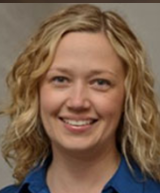
Sarah Elfering, MD
elfe0006@umn.edu
(612) 624-9444
Associate Program Director Nephrology
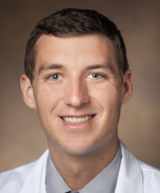
Peter Thorne, MD
pthorne@umn.edu
(612) 624-9444
Program Director Glomerular Diseases & Vasculitis

Patrick Nachman, MD
pnachman@umn.edu
(612) 624-9444
ADMINISTRATOR
2024 NRMP MATCH DATES
- November 20: Applicant and Program Rank Lists due
- December 4: Match Day
